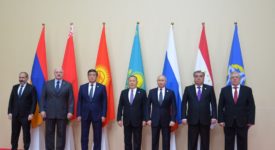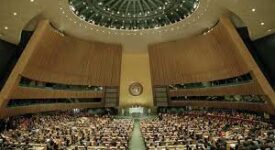The eight millennium development goals (MDGs), officially established by the Millennium Summit of the United Nations in 2000, range from fighting extreme poverty and hunger through increasing primary and secondary education enrollment, to tackling maternal health or infant/child mortality issues. Adopted by the world’s 189 nations and all international development institutions, the goals have galvanized unprecedented efforts to meet the needs of the world’s most vulnerable people.
The European Union has incorporated the MDGs into its development policy and in 2012 EU member states provided more than a half of all international aid, which was partially also result of the accelerated program called ’12-point action plan’ adopted two years earlier. The action plan is currently working with the more specific road map ‘Agenda for Change’, whose targets are more exclusive, such as the issues of good governance or sustainability of development. As the MDGs’ target year 2015 approaches, the EU seems to be getting ready to assume the role of a leader in global development talks. Beyond 2015, the Union is seeking to create a new framework with the aim to eradicate poverty within a generation.
Based on the hitherto consultations of the international community, the overarching layout of the fight against poverty beyond 2015 is supposed to be based on five pillars – basic living standards for all, promotion of ‘drivers’ of inclusive and sustainable growth, a more sustainable management of human resources, equality, equity and justice, as well as tackling insecurity and state fragility. Ultimately, the new framework is designed to alleviate impoverishment and ‘implement’ sustainable growth by 2030. At the same time, ‘Beyond 2015’ has become a platform campaigning for institutionalization of international development cooperation in the absence of MDGs.
The platform has published its vision of ‘an equitable and sustainable world where every person is safe, resilient, lives well, and enjoys their human rights, and where political and economic systems deliver well-being for all people within the limits of our planet’s resources‘. It is evident that the new campaign differs in terms of its content from the pioneering MDGs since its development focus seems to be more generalized. Moreover, the new goals, as designed for the time being, reflect a number of new development phenomena like peace and security, social justice, the issue of frail states including the role of non-state actors and terrorist groups. Moreover, unlike MDGs, Beyond 15 deems human rights as an integral part of development endeavor.
A consensus has been, more or less, found with respect to the values, vision and agenda of what development cooperation beyond 2015 will look like, yet the modes of financing are still subject to fervent discussions. The EU, for instance, has already published a report on a comprehensive and integrated system of financing development. The European Commission has divided the package between domestic public, international public and private finance, and according to the stated principles, financing should be strongly related to policies themselves. Moreover, particular development policies should be also mutually reinforcing and their prioritization should be left to the country level. Interestingly, the report stresses that the priority is given to the poorest among the countries and emerging economies are expected to contribute a fair share.
Just for an account, in absolute terms, the United States is currently (2012) the most charitable country in the world. In 2012 it provided about 30 billion USD, followed by the United Kingdom (13.4 billion USD) and Germany (13.11 billion USD). However, in relative terms the United States’ contribution accounts just for about 0.19 % of the country’s GDP, which shifts the U.S. to the 19th position. The UK’s and Germany’s contributions are about 0.56% (6th position) and 0.38% (12th position) respectively. Therefore, in relative terms, the most generous donors are Luxembourg (1% of GDP), Sweden (0.99%) and Norway (0.93%). In fact, the first twelve biggest contributors are all EU members, which potentially makes the EU’s aspiration for a leadership role in international development viable. It is also quite telling that South Korea is the only non-Western economy and Asian tiger which has made it into the TOP24.
Article Categories:
THINK-TANK




